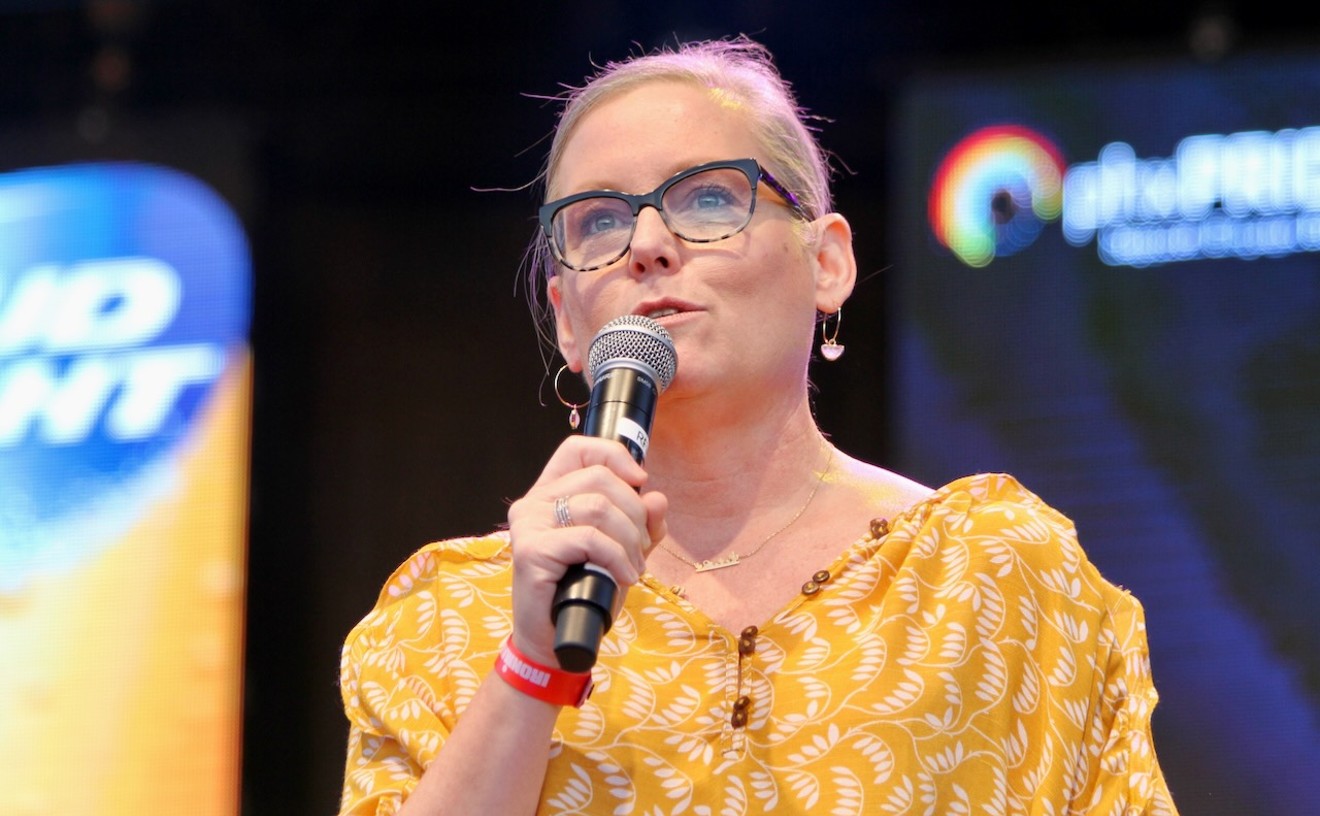Phoenix gave Veolia Transportation executives what they wanted today, a steep reduction in poor-performance fees and a reimbursement of nearly $800,000 worth of fees to the French-based transit company. And now, Veolia is giving the union what it wants.
Phoenix Mayor Greg Stanton brokered the tit-for-tat deal, effectively ending the Phoenix bus strike that started midnight on March 9. The Amalgamated Transit Union Local 1433 and Veolia execs are expected to reach a deal and resume bus service Friday morning.
Corporate executives exited the council chambers this morning -- dodging New Times' questions along the way -- pleased that Phoenix agreed to sharply reduce the amount of money the transit company had to pay the city for poor service performance, and to put nearly $800,000 back in their corporate pockets.
It is icing on the cake for Veolia, which has already managed to get more $30 million out of Phoenix since its new $388-million contract took effect in 2010.
Ruth Otte, a spokeswoman for Veolia, said that the transit company "bid it tight" in consideration for the hard financial times that Phoenix was experiencing.
It's almost comical that two years ago, Veolia's bid on the city-bus contract was $14.5 million lower than its competitors, yet Phoenix has been paying for those "savings" ever since.
Corporate officials and some members of the Phoenix City Council tried to play off the deal as routine -- as something long in the works with no ties to Veolia pinning city officials up against the wall to end the week-long bus strike that started midnight on March 9.
But even as councilmen Michael Nowakowski and Tom Simplot suggested Phoenix paring down fees for poor performance has nothing to do with the strike, a spokeswoman for Veolia conceded giving the unions what they wanted was directly tied to Phoenix giving Veolia what it wanted.
Councilmen Sal DiCiccio and Jim Waring opposed giving Veolia a pass on performance fines. And the deal left a bad taste for Councilwoman Thelda Williams, who voted for it but said she felt like the city was being manipulated by Veolia.
Otte said the transit company "wouldn't have the money" to meet union demands without concessions from Phoenix.
Phoenix officials are recasting the discussion about the same performance fines they noted in the city-bus contract would be "strictly enforced," and now saying that the liquidated damages are too high. And, they say, Phoenix would likely lose in court if Veolia were to challenge the liquidated damages.
As proof, Phoenix cities the following paragraph from the Federal Transit Administration's website:
The courts will not enforce the liquidated damages provision if they construe them to be a penalty. Liquidated damages are intended to compensate the owner for real economic damages and not to be used as a penalty. It is likely that a court would consider the imposition of both liquidated damages and a penalty for late delivery to be punitive and thus unenforceable.
Otte tells New Times that the contract had been renegotiated back in 2010, long before a bus strike was underway in Phoenix, and in return for the deal, the transit company agreed to take responsibility for the employees' underfunded pension.
She is right -- the contract was renegotiated in 2010.
For those who don't recall, from Day One, Veolia officials had a problem with the performance fines, or liquidated damages. Phoenix officials told Veolia that if they continued objecting to them, the company would not be considered for the new, $388-million, 5-year contract. Veolia executives, in writing, withdrew their objections and landed a new contract with the city. But they still wanted Phoenix to pay them millions to cover employee-related costs to close out the old contract.
Phoenix transit officials weren't budging, so former Phoenix Mayor Phil Gordon suggested the company just threaten to walk away, regardless of the devastating effects that would have had on the bus-riding public. The advice, though ill-conceived, makes sense considering that Gordon's girlfriend at the time was on Veolia's payroll as a consultant coaching them on how to win the city contract, and Gordon's close friend Billy Shields is Veolia's paid lobbyist. To say the least, Gordon's advice was helpful because, after Veolia put it into motion, it sent City Manager David Cavazos and others flying to Chicago to give Veolia what it wanted.
There, in late May 2010, as Otte says, the contract was changed.
But the notion that Veolia agreed to take financial responsibility for the employees' pension? That doesn't mesh with the Settlement Agreement reached in Chicago.
The more than $25 million needed to prop up the pension that became underfunded because of a sagging economy is being plucked from Phoenix's pocket, not Veolia's.
Phoenix agreed to pay $25.5 million toward the pension, and it's laid out in four different section of the renegotiated contract.
In one section, Phoenix agreed to give Veolia $13.5 million to infuse the employees' pension. In another, it agreed to return to Veolia $2.5 million worth of the liquidated damages. A third section details an agreement for Phoenix to throw another $3.5 million into the ailing pension -- money that would either come from the same liquidated damages or by Veolia and Phoenix identifying savings in city bus service. And, a fourth second dictates that Phoenix agreed to kick in another $6 million on top of that.
Aside from the $25.5 million for the pension, Phoenix also agreed to give Veolia another $2 million to cover Veolia employees' accrued sick leave, agreed to not try to recoup $681,000 that the Phoenix Public Transit Department had already unwittingly paid for Veolia employees' sick days, delayed collecting any poor-performance fees for four months, essentially waiving more than $2 million, and by agreeing not to collect any liquidated damages for strike-related performance shortfalls, gave up at least another $300,000.
We're expecting to hear back from Phoenix officials soon for more details on who is really funding the pension for Veolia employees.










